Detailed Description
Binary protocol implementation.
This implementation would not happen without the documentation provided by Jon Zeeff (jon@z.nosp@m.eeff.nosp@m..com)
Integration with EFI Analytics Tuner Studio software
Tuner Studio has a really simple protocol, a minimal implementation capable of displaying current engine state on the gauges would require only two commands: queryCommand and ochGetCommand
queryCommand: Communication initialization command. TunerStudio sends a single byte H ECU response: One of the known ECU id strings.
ochGetCommand: Request for output channels state.TunerStudio sends a single byte O ECU response: A snapshot of output channels as described in [OutputChannels] section of the .ini file The length of this block is 'ochBlockSize' property of the .ini file
These two commands are enough to get working gauges. In order to start configuring the ECU using tuner studio, three more commands should be implemented:
See also https://www.efianalytics.com/TunerStudio/docs/EFI%20Analytics%20ECU%20Definition%20files.pdf
- Date
- Oct 22, 2013
This file is part of rusEfi - see http://rusefi.com
rusEfi is free software; you can redistribute it and/or modify it under the terms of the GNU General Public License as published by the Free Software Foundation; either version 3 of the License, or (at your option) any later version.
rusEfi is distributed in the hope that it will be useful, but WITHOUT ANY WARRANTY; without even the implied warranty of MERCHANTABILITY or FITNESS FOR A PARTICULAR PURPOSE. See the GNU General Public License for more details.
You should have received a copy of the GNU General Public License along with this program. If not, see http://www.gnu.org/licenses/.
This file is part of rusEfi - see http://rusefi.com
rusEfi is free software; you can redistribute it and/or modify it under the terms of the GNU General Public License as published by the Free Software Foundation; either version 3 of the License, or (at your option) any later version.
rusEfi is distributed in the hope that it will be useful, but WITHOUT ANY WARRANTY; without even the implied warranty of MERCHANTABILITY or FITNESS FOR A PARTICULAR PURPOSE. See the GNU General Public License for more details.
You should have received a copy of the GNU General Public License along with this program. If not, see http://www.gnu.org/licenses/.
Definition in file tunerstudio.cpp.
Variables | |
| uint8_t | ts_blank_page_placeholder [256] |
| TunerStudio | tsInstance |
| tunerstudio_counters_s | tsState |
| CommandHandler | console_line_callback |
Function Documentation
◆ getTunerStudioPageSize()
Definition at line 195 of file tunerstudio.cpp.
Referenced by validateOffsetCount().


◆ getWorkingPageAddr()
|
static |
Definition at line 171 of file tunerstudio.cpp.
Referenced by TunerStudio::handleCrc32Check(), TunerStudio::handlePageReadCommand(), and TunerStudio::handleWriteChunkCommand().


◆ handleBurnCommand()
|
static |
'Burn' command is a command to commit the changes
Definition at line 471 of file tunerstudio.cpp.
Referenced by TunerStudio::handleCrcCommand().
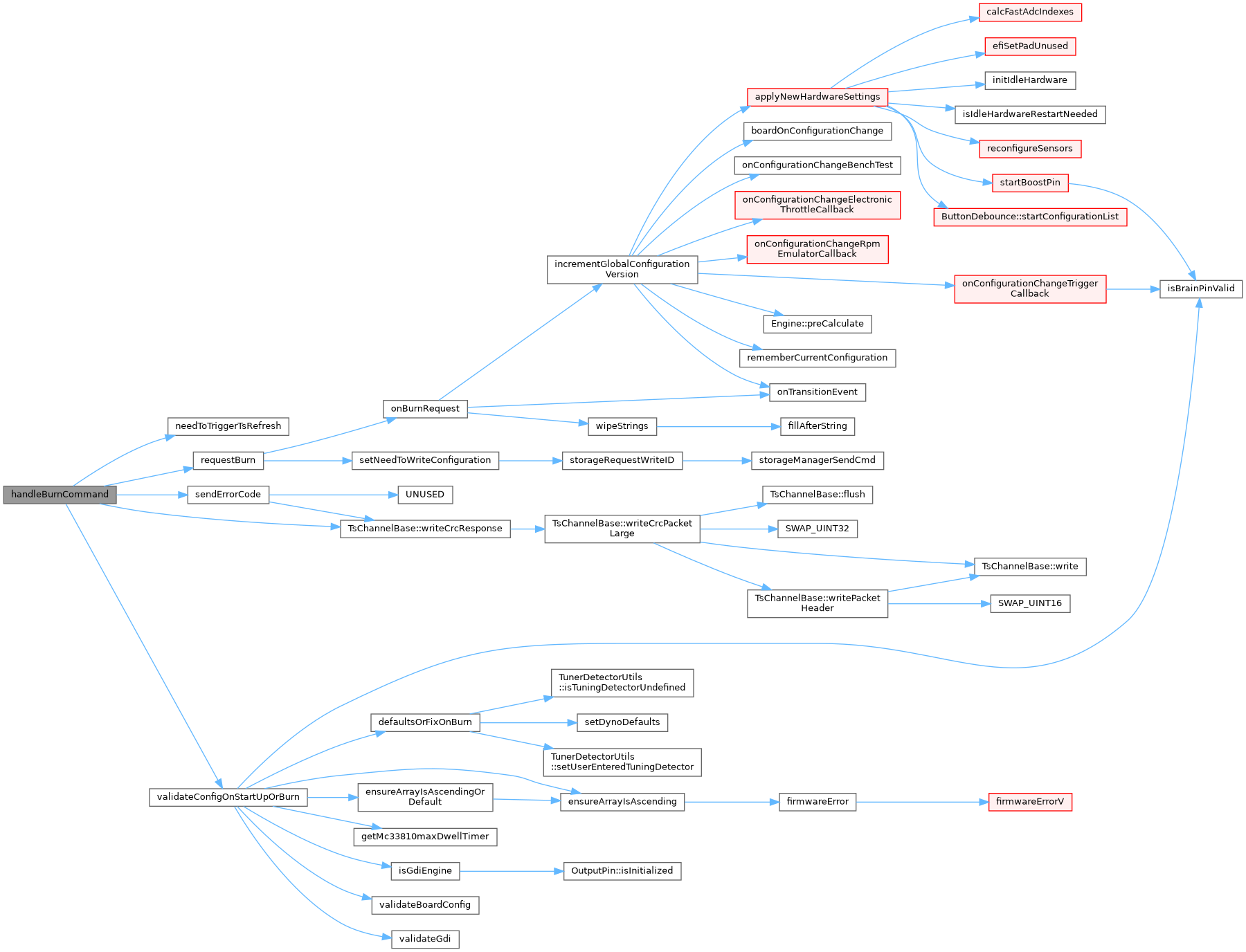

◆ handleGetConfigErorr()
|
static |
Definition at line 555 of file tunerstudio.cpp.
Referenced by TunerStudio::handleCrcCommand().
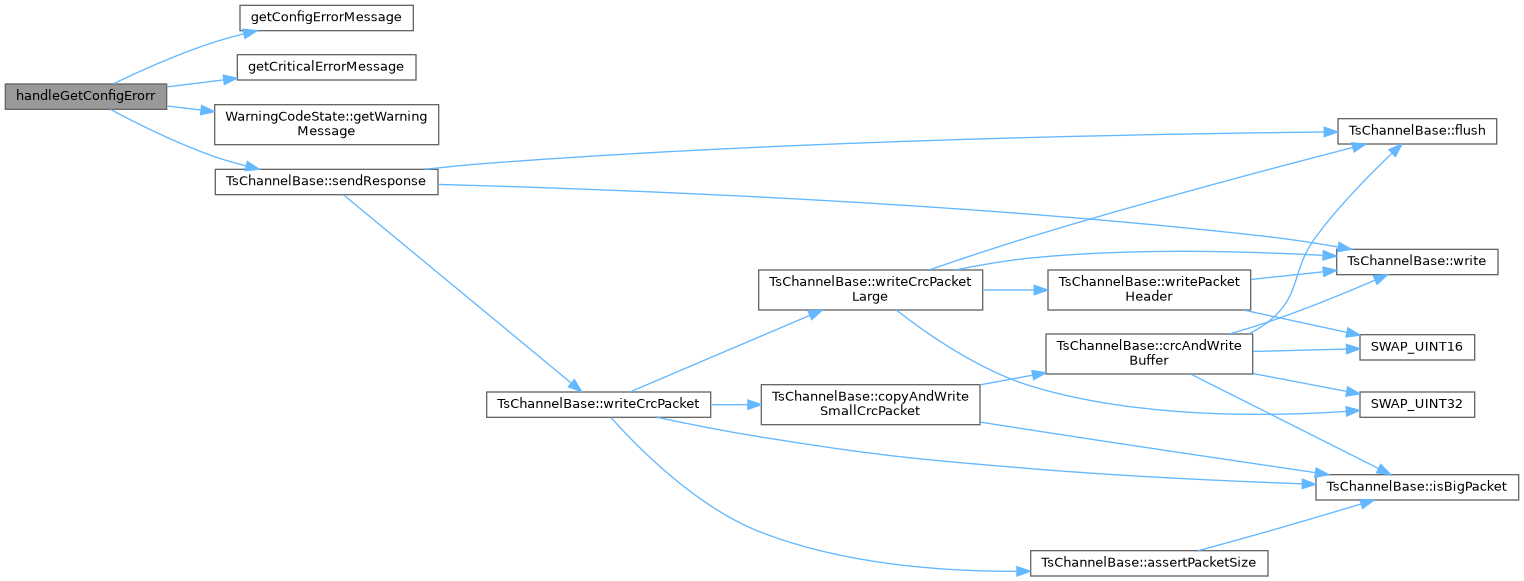

◆ handleGetText()
|
static |
Definition at line 787 of file tunerstudio.cpp.
Referenced by TunerStudio::handleCrcCommand().
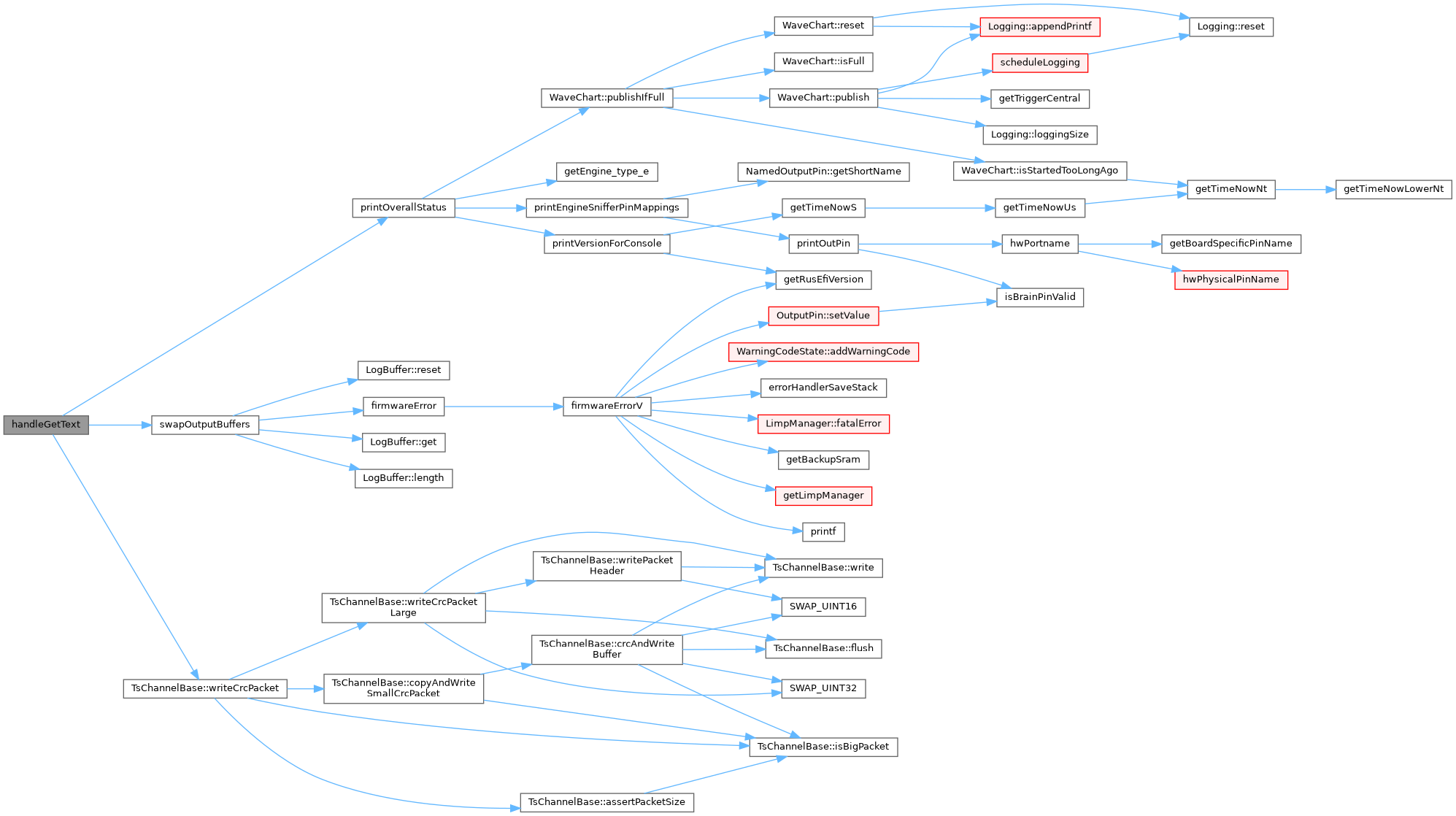

◆ handleGetVersion()
|
static |
Definition at line 780 of file tunerstudio.cpp.
Referenced by TunerStudio::handleCrcCommand().


◆ handleTestCommand()
|
static |
rusEfi own test command
this is NOT a standard TunerStudio command, this is my own extension of the protocol to simplify troubleshooting
Definition at line 528 of file tunerstudio.cpp.
Referenced by TunerStudio::handleCrcCommand(), and TunerStudio::handlePlainCommand().


◆ isBoardAskingTriggerTsRefresh()
| PUBLIC_API_WEAK bool isBoardAskingTriggerTsRefresh | ( | ) |
Definition at line 269 of file tunerstudio.cpp.
◆ isKnownCommand()
Definition at line 503 of file tunerstudio.cpp.
Referenced by tsProcessOne().

◆ isTouchingArea()
| bool isTouchingArea | ( | uint16_t | offset, |
| uint16_t | count, | ||
| int | areaStart, | ||
| int | areaSize | ||
| ) |
Definition at line 291 of file tunerstudio.cpp.
Referenced by isTouchingVe().

◆ isTouchingVe()
| PUBLIC_API_WEAK bool isTouchingVe | ( | uint16_t | offset, |
| uint16_t | count | ||
| ) |
Definition at line 281 of file tunerstudio.cpp.
Referenced by onCalibrationWrite().


◆ isTuningVeNow()
| bool isTuningVeNow | ( | ) |
Definition at line 1044 of file tunerstudio.cpp.
Referenced by checkIfTuningVeNow(), and TpsAccelEnrichment::getTpsEnrichment().

◆ needToTriggerTsRefresh()
| bool needToTriggerTsRefresh | ( | ) |
Definition at line 273 of file tunerstudio.cpp.
Referenced by handleBurnCommand(), TunerStudio::handleWriteChunkCommand(), and updateTunerStudioState().

◆ onApplyPreset()
| void onApplyPreset | ( | ) |
Definition at line 277 of file tunerstudio.cpp.
Referenced by applyPreset(), handleCommandX14(), and vinStrategy().

◆ onCalibrationWrite()
|
static |
Definition at line 285 of file tunerstudio.cpp.
Referenced by TunerStudio::handleWriteChunkCommand().


◆ printErrorCounters()
|
static |
Definition at line 99 of file tunerstudio.cpp.
Referenced by printTsStats(), and tunerStudioError().

◆ printScatterList()
|
static |
Definition at line 116 of file tunerstudio.cpp.
◆ printTsStats()
|
static |
Definition at line 141 of file tunerstudio.cpp.
Referenced by setTsSpeed(), and startTunerStudioConnectivity().


◆ requestBurn()
| void requestBurn | ( | ) |
Definition at line 457 of file tunerstudio.cpp.
Referenced by configureRusefiLuaHooks(), handleBurnCommand(), initFlash(), and unlockEcu().
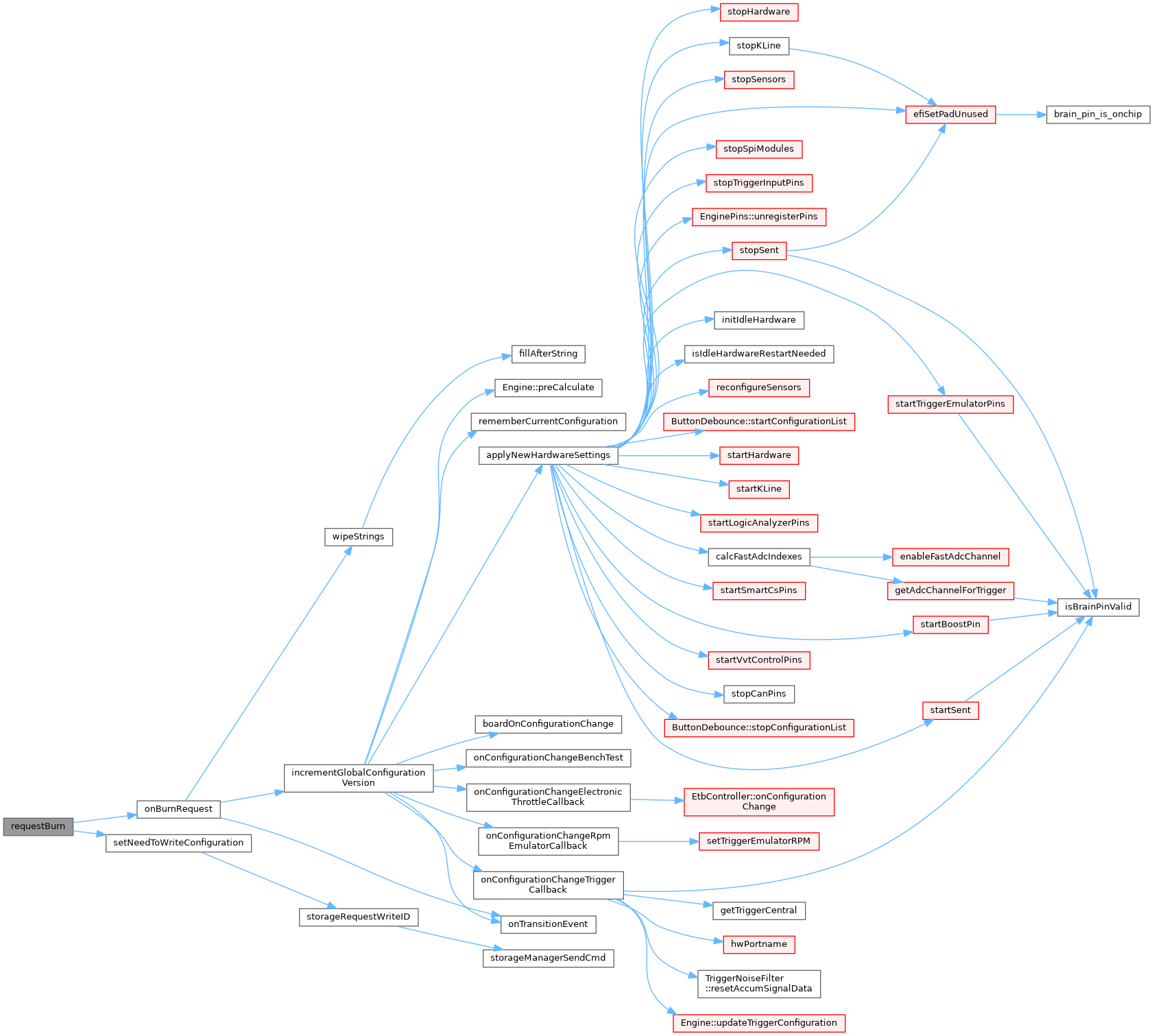

◆ resetTs()
|
static |
Definition at line 137 of file tunerstudio.cpp.
Referenced by startTunerStudioConnectivity().

◆ sendErrorCode()
| void sendErrorCode | ( | TsChannelBase * | tsChannel, |
| uint8_t | code, | ||
| const char * | msg | ||
| ) |
Definition at line 234 of file tunerstudio.cpp.
Referenced by handleBurnCommand(), tsProcessOne(), and validateOffsetCount().


◆ sendOkResponse()
|
static |
Definition at line 230 of file tunerstudio.cpp.
Referenced by TunerStudio::handleCrcCommand(), and TunerStudio::handleWriteChunkCommand().


◆ setTsSpeed()
|
static |
Definition at line 157 of file tunerstudio.cpp.
Referenced by startTunerStudioConnectivity().


◆ startTunerStudioConnectivity()
| void startTunerStudioConnectivity | ( | ) |
Definition at line 1049 of file tunerstudio.cpp.
Referenced by runRusEfi().
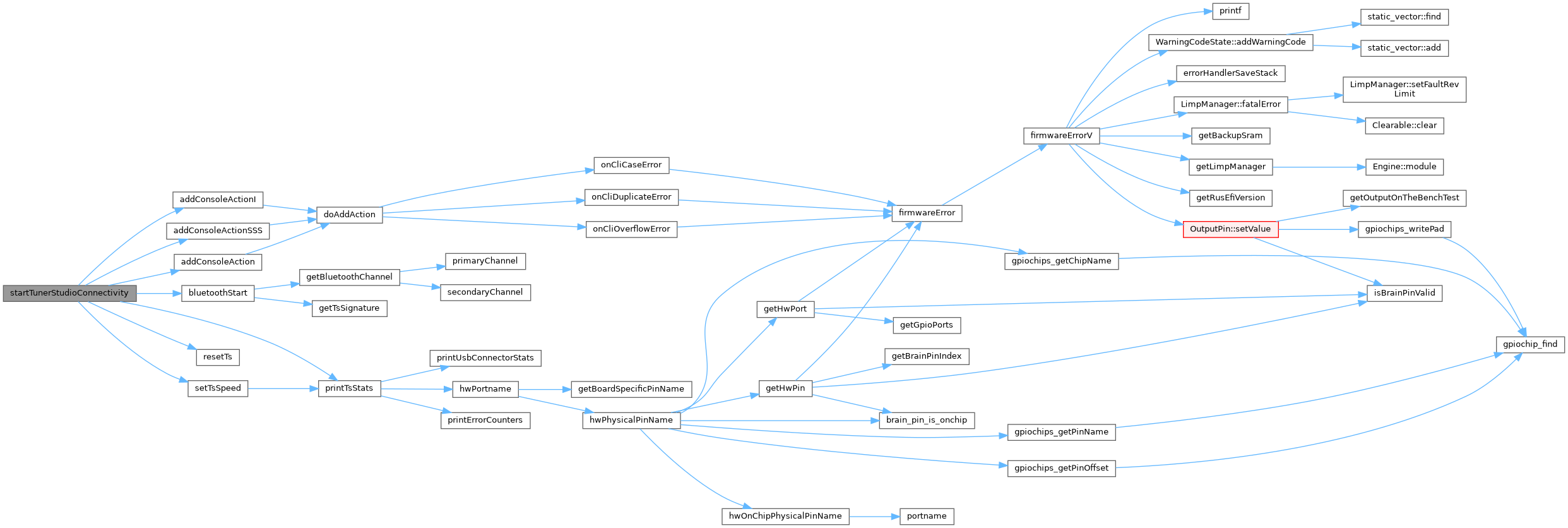

◆ tsProcessOne()
|
static |
Definition at line 615 of file tunerstudio.cpp.
Referenced by TunerstudioThread::ThreadTask().
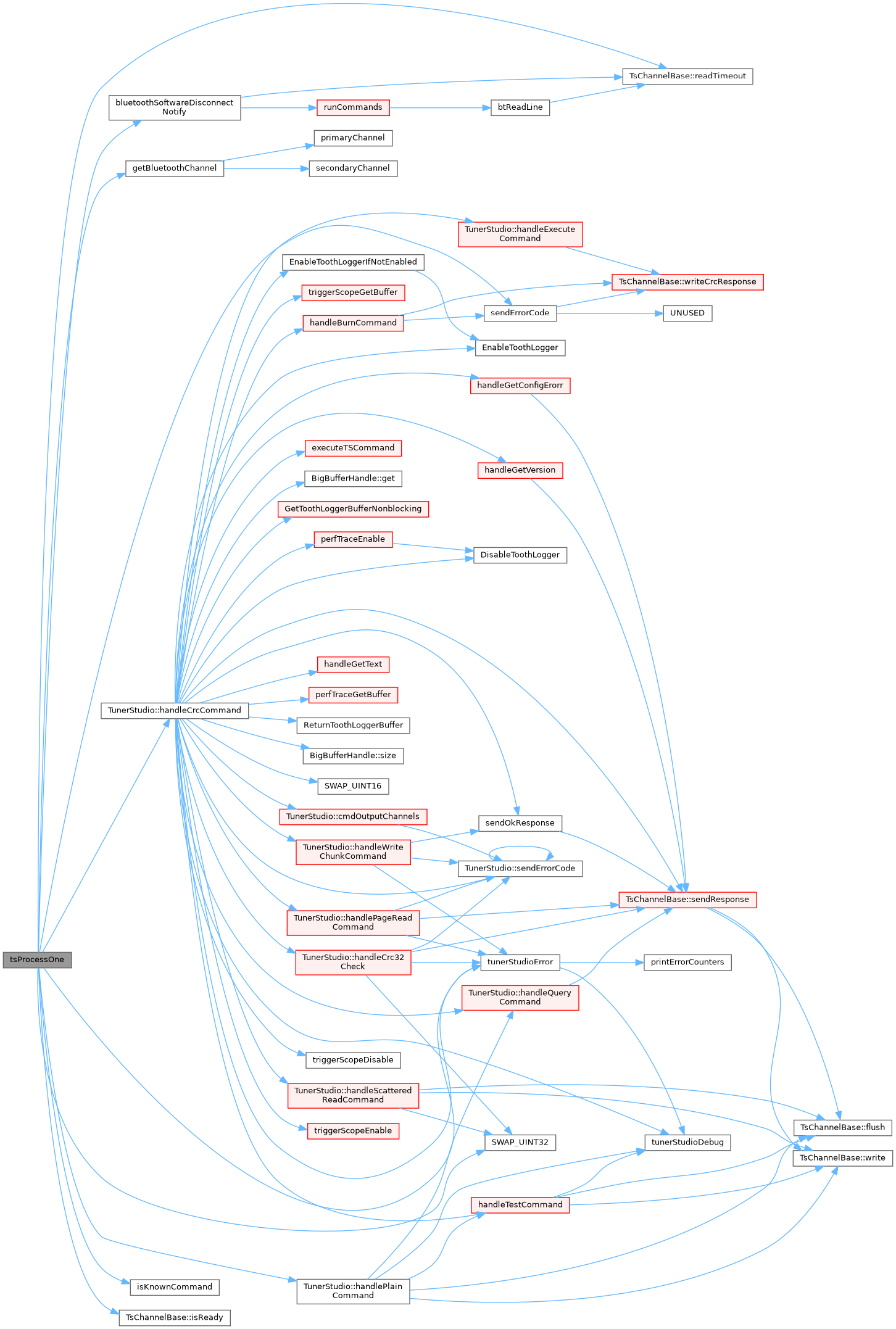

◆ tunerStudioDebug()
| void tunerStudioDebug | ( | TsChannelBase * | tsChannel, |
| const char * | msg | ||
| ) |
Definition at line 162 of file tunerstudio.cpp.
Referenced by TunerStudio::handlePlainCommand(), handleTestCommand(), and tunerStudioError().

◆ tunerStudioError()
| void tunerStudioError | ( | TsChannelBase * | tsChannel, |
| const char * | msg | ||
| ) |
Definition at line 768 of file tunerstudio.cpp.
Referenced by getWorkingPageAddr(), TunerStudio::handleCrc32Check(), TunerStudio::handleCrcCommand(), TunerStudio::handlePageReadCommand(), TunerStudio::handleWriteChunkCommand(), tsProcessOne(), and validateOffsetCount().


◆ validateOffsetCount()
|
static |
Definition at line 218 of file tunerstudio.cpp.
Referenced by TunerStudio::handleCrc32Check(), TunerStudio::handlePageReadCommand(), and TunerStudio::handleWriteChunkCommand().


Variable Documentation
◆ console_line_callback
|
extern |
Definition at line 53 of file console_io.cpp.
Referenced by TunerStudio::handleExecuteCommand(), and startConsole().
◆ ts_blank_page_placeholder
| uint8_t ts_blank_page_placeholder[256] |
Definition at line 169 of file tunerstudio.cpp.
Referenced by getWorkingPageAddr().
◆ tsInstance
| TunerStudio tsInstance |
Definition at line 613 of file tunerstudio.cpp.
Referenced by tsProcessOne().
◆ tsState
| tunerstudio_counters_s tsState |
Definition at line 766 of file tunerstudio.cpp.
Referenced by TunerStudio::cmdOutputChannels(), handleBurnCommand(), TunerStudio::handleCrc32Check(), handleGetText(), TunerStudio::handlePageReadCommand(), TunerStudio::handleQueryCommand(), TunerStudio::handleScatteredReadCommand(), handleTestCommand(), TunerStudio::handleWriteChunkCommand(), printErrorCounters(), resetTs(), sendErrorCode(), startTunerStudioConnectivity(), tsProcessOne(), and tunerStudioError().